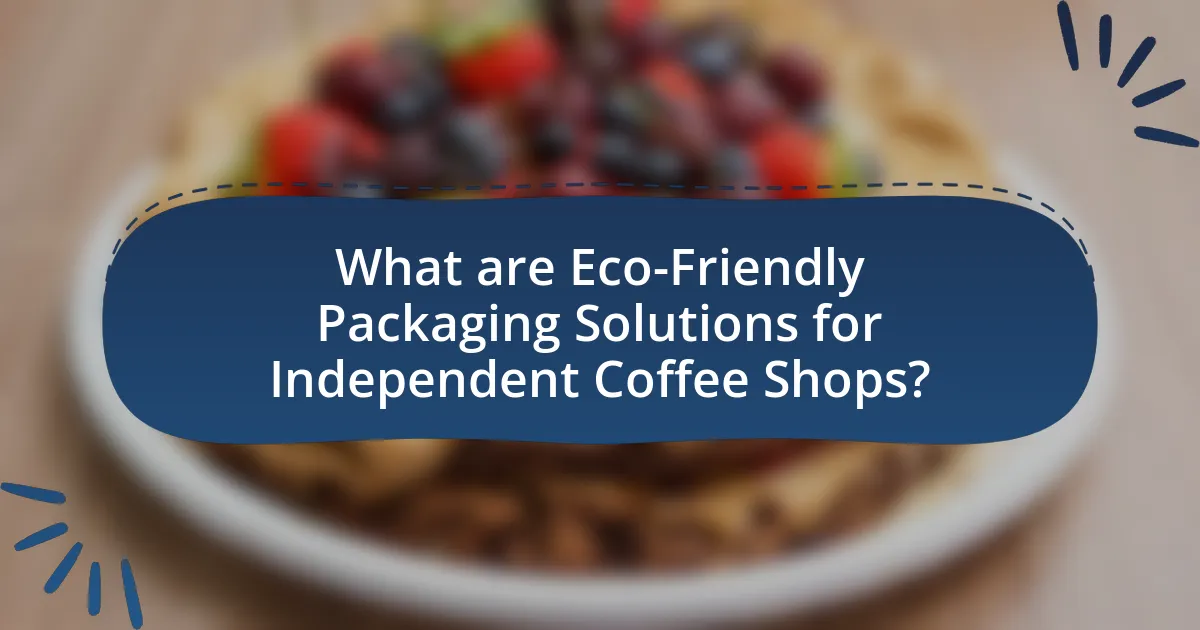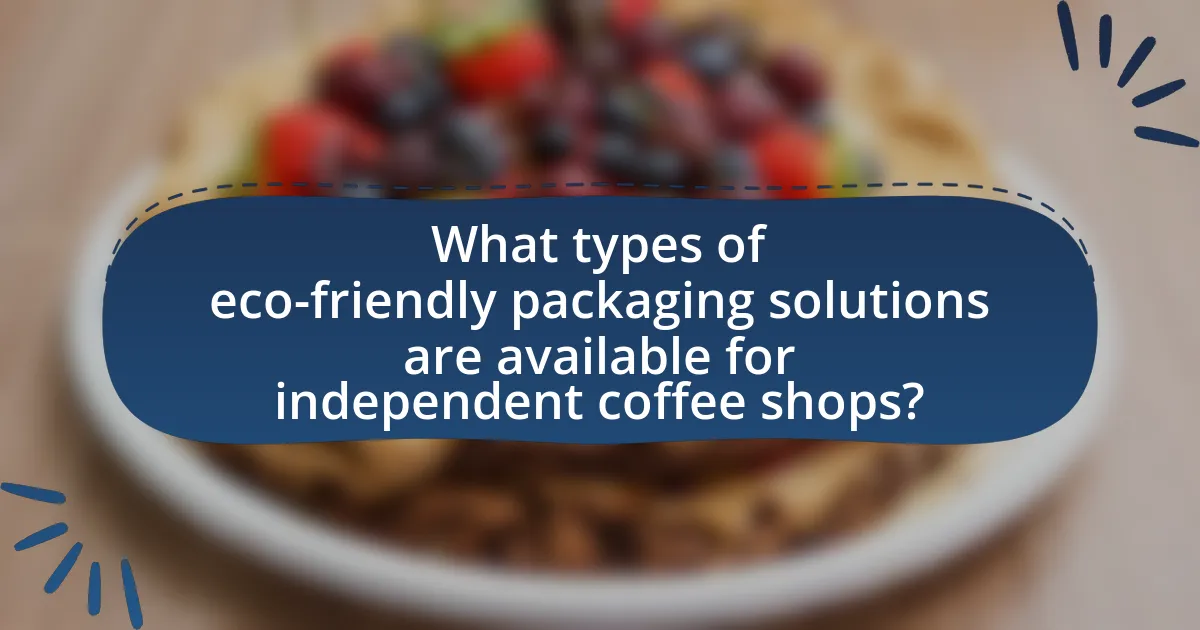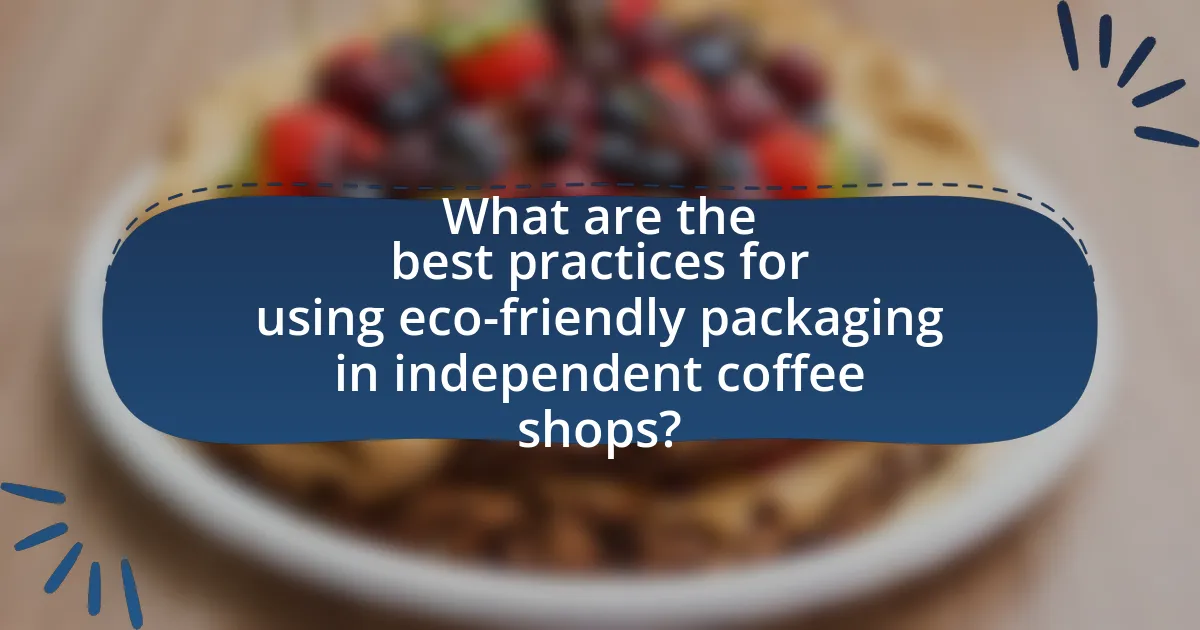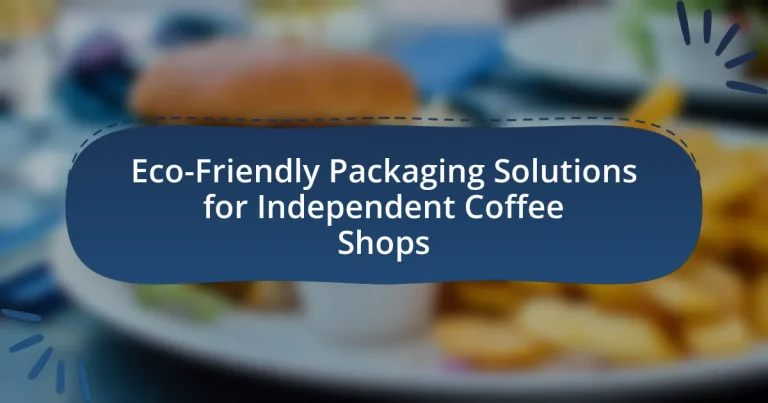Eco-friendly packaging solutions for independent coffee shops encompass biodegradable cups, compostable bags, and recycled paper products, which significantly reduce environmental impact by decomposing naturally and minimizing waste. These sustainable materials differ from traditional packaging, which often relies on single-use plastics, contributing to landfill waste. The article explores the benefits of eco-friendly packaging, including enhanced brand reputation and consumer loyalty, while addressing challenges such as cost and supply chain issues. It also highlights best practices for implementation, customer education, and marketing strategies to effectively promote sustainability in the coffee shop industry.

What are Eco-Friendly Packaging Solutions for Independent Coffee Shops?
Eco-friendly packaging solutions for independent coffee shops include biodegradable cups, compostable bags, and recycled paper products. These materials reduce environmental impact by breaking down naturally and minimizing waste. For instance, biodegradable cups made from plant-based materials can decompose within 90 to 180 days in commercial composting facilities, significantly lessening landfill contributions. Additionally, using compostable bags made from materials like cornstarch can help reduce plastic pollution, as they are designed to break down in composting environments. Recycled paper products, such as coffee sleeves and napkins, further support sustainability by utilizing post-consumer waste, thus conserving resources and energy.
How do eco-friendly packaging solutions differ from traditional packaging?
Eco-friendly packaging solutions differ from traditional packaging primarily in their materials and environmental impact. Eco-friendly packaging is made from renewable, biodegradable, or recyclable materials, such as plant-based plastics or recycled paper, which reduce waste and pollution. In contrast, traditional packaging often relies on single-use plastics and non-biodegradable materials, contributing significantly to landfill waste and environmental degradation. According to a study by Smithers Pira, the global market for sustainable packaging is projected to reach $500 billion by 2027, indicating a growing shift towards environmentally responsible practices in packaging.
What materials are commonly used in eco-friendly packaging?
Common materials used in eco-friendly packaging include recycled paper, biodegradable plastics, and plant-based materials. Recycled paper is sourced from post-consumer waste, reducing the need for virgin materials and minimizing environmental impact. Biodegradable plastics, often made from cornstarch or other renewable resources, break down more easily in composting environments compared to traditional plastics. Plant-based materials, such as bamboo or sugarcane, are sustainable alternatives that offer durability while being environmentally friendly. These materials collectively contribute to reducing waste and promoting sustainability in packaging solutions for independent coffee shops.
How do these materials impact the environment?
Eco-friendly packaging materials significantly reduce environmental impact by minimizing waste and pollution. Biodegradable materials, such as plant-based plastics and recycled paper, decompose more quickly than traditional plastics, thereby decreasing landfill accumulation and lowering greenhouse gas emissions. For instance, a study by the Ellen MacArthur Foundation found that switching to biodegradable packaging could reduce plastic pollution in oceans by up to 80% by 2040. Additionally, using recycled materials conserves natural resources and energy, as producing new materials often requires extensive extraction and processing. Thus, eco-friendly packaging solutions contribute to a more sustainable environment by promoting resource conservation and reducing pollution.
Why are eco-friendly packaging solutions important for independent coffee shops?
Eco-friendly packaging solutions are important for independent coffee shops because they enhance brand reputation and attract environmentally conscious consumers. By utilizing sustainable materials, these shops can differentiate themselves in a competitive market, as studies show that 72% of consumers prefer brands that are environmentally responsible. Additionally, eco-friendly packaging reduces waste and minimizes the environmental impact, aligning with the growing trend of sustainability in the food and beverage industry. This commitment not only fosters customer loyalty but can also lead to increased sales, as consumers are willing to pay more for products that are packaged sustainably.
What role does sustainability play in consumer choices?
Sustainability significantly influences consumer choices by driving preferences towards eco-friendly products and practices. Research indicates that 66% of global consumers are willing to pay more for sustainable brands, reflecting a growing demand for environmentally responsible options. This trend is particularly evident in sectors like food and beverage, where consumers increasingly favor independent coffee shops that utilize sustainable packaging solutions. The shift towards sustainability is not only a response to environmental concerns but also aligns with consumers’ values, leading to increased loyalty and brand preference for businesses that prioritize eco-friendly practices.
How can eco-friendly packaging enhance a coffee shop’s brand image?
Eco-friendly packaging can enhance a coffee shop’s brand image by demonstrating a commitment to sustainability and attracting environmentally conscious consumers. This type of packaging not only reduces waste but also aligns with the growing consumer preference for brands that prioritize environmental responsibility. According to a 2021 survey by Nielsen, 73% of global consumers are willing to change their consumption habits to reduce their environmental impact, indicating that eco-friendly practices can significantly influence purchasing decisions. By adopting eco-friendly packaging, coffee shops can differentiate themselves in a competitive market, foster customer loyalty, and enhance their overall reputation as socially responsible businesses.
What challenges do independent coffee shops face when adopting eco-friendly packaging?
Independent coffee shops face several challenges when adopting eco-friendly packaging, primarily related to cost, supply chain limitations, and consumer awareness. The cost of eco-friendly materials often exceeds that of traditional packaging, making it financially burdensome for smaller businesses with tight margins. Additionally, sourcing sustainable packaging can be difficult due to limited availability and inconsistent supply from vendors, which complicates inventory management. Furthermore, consumer awareness and demand for eco-friendly options may not be strong enough to justify the transition, leading to concerns about whether the investment will yield sufficient returns. These factors collectively hinder the ability of independent coffee shops to implement eco-friendly packaging solutions effectively.
What are the cost implications of switching to eco-friendly packaging?
Switching to eco-friendly packaging typically results in higher initial costs compared to conventional packaging. This increase is often due to the more expensive materials and production processes associated with sustainable options. For instance, a study by the Ellen MacArthur Foundation indicates that while the upfront costs for biodegradable packaging can be 20-30% higher, these costs may be offset by long-term savings through reduced waste disposal fees and enhanced brand loyalty from environmentally conscious consumers. Additionally, many independent coffee shops may benefit from potential tax incentives or subsidies aimed at promoting sustainable practices, further mitigating the financial impact of the switch.
How can coffee shops overcome supply chain issues related to eco-friendly packaging?
Coffee shops can overcome supply chain issues related to eco-friendly packaging by diversifying their suppliers and establishing direct relationships with manufacturers of sustainable materials. By sourcing from multiple suppliers, coffee shops reduce dependency on a single source, which mitigates risks associated with delays or shortages. Additionally, forming partnerships with local or regional manufacturers can enhance reliability and decrease transportation costs, as evidenced by a study from the Sustainable Packaging Coalition, which highlights that local sourcing can improve supply chain resilience. Implementing these strategies allows coffee shops to maintain a steady supply of eco-friendly packaging while supporting sustainability initiatives.

What types of eco-friendly packaging solutions are available for independent coffee shops?
Independent coffee shops can utilize several types of eco-friendly packaging solutions, including compostable cups, biodegradable bags, and recyclable containers. Compostable cups, made from materials like PLA (polylactic acid), break down in industrial composting facilities, reducing landfill waste. Biodegradable bags, often made from plant-based materials, decompose naturally and are a sustainable alternative to plastic. Recyclable containers, such as those made from glass or certain plastics, can be processed and reused, minimizing environmental impact. These options not only align with sustainability goals but also appeal to environmentally conscious consumers, enhancing brand reputation.
What are the most popular eco-friendly packaging options?
The most popular eco-friendly packaging options include biodegradable materials, compostable packaging, recycled paper, and reusable containers. Biodegradable materials break down naturally, reducing landfill waste; for instance, PLA (polylactic acid) is derived from corn starch and is widely used for food packaging. Compostable packaging, such as those made from plant-based materials, can decompose in industrial composting facilities, contributing to soil health. Recycled paper products, including bags and boxes, utilize post-consumer waste, thus conserving resources and reducing environmental impact. Reusable containers, often made from glass or stainless steel, encourage sustainability by minimizing single-use waste. These options are increasingly favored by consumers and businesses alike, reflecting a growing commitment to environmental responsibility in the packaging industry.
How do biodegradable cups and containers work?
Biodegradable cups and containers work by breaking down into natural substances through the action of microorganisms, such as bacteria and fungi. These products are typically made from materials like plant starches, cellulose, or polylactic acid (PLA), which are designed to decompose in composting environments. For instance, PLA cups can break down within 90 to 180 days in industrial composting facilities, returning nutrients to the soil. This process contrasts with traditional plastic, which can take hundreds of years to decompose, thus providing a more sustainable option for packaging in independent coffee shops.
What are the benefits of using compostable packaging?
Compostable packaging offers significant environmental benefits by reducing waste and promoting sustainability. Unlike traditional plastic, compostable materials break down into natural substances, enriching the soil and minimizing landfill contributions. According to a study by the Biodegradable Products Institute, compostable packaging can divert up to 30% of waste from landfills, thereby decreasing greenhouse gas emissions. Additionally, using compostable packaging enhances a brand’s eco-friendly image, appealing to environmentally conscious consumers and potentially increasing customer loyalty.
How can independent coffee shops implement these packaging solutions effectively?
Independent coffee shops can implement eco-friendly packaging solutions effectively by selecting biodegradable or compostable materials for their cups, lids, and bags. Research indicates that using materials like PLA (polylactic acid) and recycled paper can significantly reduce environmental impact, as these materials decompose more quickly than traditional plastics. Additionally, training staff on the importance of these packaging choices and encouraging customers to bring reusable containers can enhance the effectiveness of the implementation. A study by the National Coffee Association found that 60% of consumers prefer businesses that prioritize sustainability, indicating that adopting eco-friendly packaging can also improve customer loyalty and brand image.
What steps should be taken to transition to eco-friendly packaging?
To transition to eco-friendly packaging, independent coffee shops should first assess their current packaging materials and identify alternatives that are biodegradable, compostable, or recyclable. This assessment allows shops to replace single-use plastics with sustainable options such as plant-based plastics, recycled paper, or reusable containers.
Next, coffee shops should engage suppliers who specialize in eco-friendly packaging solutions, ensuring that the materials meet environmental standards and certifications. For instance, sourcing packaging that is certified by organizations like the Forest Stewardship Council (FSC) guarantees responsible sourcing of materials.
Additionally, implementing a customer education program about the benefits of eco-friendly packaging can enhance consumer support and participation in sustainability efforts. Research indicates that 66% of consumers are willing to pay more for sustainable brands, highlighting the potential for increased customer loyalty and sales.
Finally, tracking and measuring the impact of the transition on waste reduction and customer feedback will help refine the approach and demonstrate the effectiveness of eco-friendly packaging initiatives.
How can staff be trained to handle eco-friendly packaging?
Staff can be trained to handle eco-friendly packaging through comprehensive training programs that focus on the materials, benefits, and proper usage of sustainable packaging options. These programs should include hands-on workshops that demonstrate the differences between traditional and eco-friendly packaging, emphasizing the environmental impact of each choice. For instance, training can cover the use of biodegradable materials, the importance of reducing plastic waste, and how to educate customers about these choices. Research indicates that businesses that implement effective training on sustainable practices see a 20% increase in employee engagement and a 15% improvement in customer satisfaction, reinforcing the value of such training initiatives.

What are the best practices for using eco-friendly packaging in independent coffee shops?
The best practices for using eco-friendly packaging in independent coffee shops include selecting biodegradable materials, minimizing packaging waste, and encouraging customer participation in sustainability efforts. Biodegradable materials, such as compostable cups and bags made from plant-based sources, break down naturally and reduce landfill impact. Minimizing packaging waste can be achieved by offering bulk options and reusable containers, which not only cut down on single-use items but also appeal to environmentally conscious consumers. Additionally, engaging customers through incentives for bringing their own containers or offering discounts for using reusable items fosters a culture of sustainability. These practices align with the growing consumer demand for eco-friendly solutions, as evidenced by a 2021 survey indicating that 72% of consumers prefer brands that use sustainable packaging.
How can coffee shops educate customers about their eco-friendly packaging choices?
Coffee shops can educate customers about their eco-friendly packaging choices by implementing clear signage and informational materials that explain the benefits and features of their sustainable packaging. For instance, using posters or brochures that detail how the packaging is made from recycled materials or is biodegradable can enhance customer awareness. Research indicates that visual communication significantly increases consumer understanding of sustainability practices, with studies showing that 70% of consumers are more likely to support businesses that demonstrate environmental responsibility. Additionally, staff training on eco-friendly practices enables employees to engage customers in conversations about the importance of sustainable packaging, further reinforcing the message.
What marketing strategies can highlight eco-friendly packaging initiatives?
To highlight eco-friendly packaging initiatives, independent coffee shops can implement strategies such as storytelling, social media campaigns, and partnerships with environmental organizations. Storytelling allows shops to share the journey of their sustainable packaging, emphasizing its benefits for the environment and community. Social media campaigns can showcase the packaging in use, encouraging customers to share their experiences, which increases visibility and engagement. Collaborating with environmental organizations can enhance credibility and reach, as these partnerships often attract eco-conscious consumers. According to a 2021 survey by Nielsen, 73% of consumers are willing to change their consumption habits to reduce environmental impact, indicating that effective marketing of eco-friendly initiatives can resonate strongly with the target audience.
How can customer feedback be utilized to improve packaging choices?
Customer feedback can be utilized to improve packaging choices by directly informing businesses about consumer preferences and expectations regarding sustainability and functionality. For instance, surveys and reviews can reveal customer desires for biodegradable materials or minimalistic designs, prompting coffee shops to adopt eco-friendly packaging solutions that align with these preferences. Research indicates that 72% of consumers are willing to pay more for sustainable packaging, highlighting the importance of adapting packaging strategies based on customer insights to enhance satisfaction and brand loyalty.
What tips can help independent coffee shops maximize the benefits of eco-friendly packaging?
Independent coffee shops can maximize the benefits of eco-friendly packaging by selecting materials that are biodegradable or compostable, which reduces environmental impact. Utilizing packaging that clearly communicates its eco-friendly attributes can enhance customer awareness and loyalty, as studies show that 66% of consumers are willing to pay more for sustainable brands. Additionally, implementing a recycling program encourages customers to return used packaging, further promoting sustainability and community engagement. Finally, collaborating with local suppliers for packaging materials can reduce carbon footprints and support the local economy, aligning with the values of eco-conscious consumers.
How can shops balance cost and sustainability in their packaging choices?
Shops can balance cost and sustainability in their packaging choices by selecting materials that are both affordable and environmentally friendly, such as biodegradable or recyclable options. For instance, using compostable packaging made from plant-based materials can reduce waste while often being competitively priced compared to traditional plastic. Research indicates that 60% of consumers are willing to pay more for sustainable packaging, which can offset initial costs and enhance brand loyalty. Additionally, bulk purchasing of sustainable materials can lower costs further, making it economically viable for shops to adopt greener practices.
What partnerships can enhance the effectiveness of eco-friendly packaging solutions?
Partnerships with sustainable material suppliers, local recycling programs, and environmental organizations can enhance the effectiveness of eco-friendly packaging solutions. Sustainable material suppliers provide biodegradable or compostable packaging options, which align with eco-friendly practices. Collaborating with local recycling programs ensures that packaging is disposed of responsibly, reducing waste and promoting a circular economy. Additionally, partnerships with environmental organizations can help coffee shops gain credibility and access resources for implementing sustainable practices, as evidenced by studies showing that businesses engaged in sustainability initiatives often see increased customer loyalty and brand reputation.
